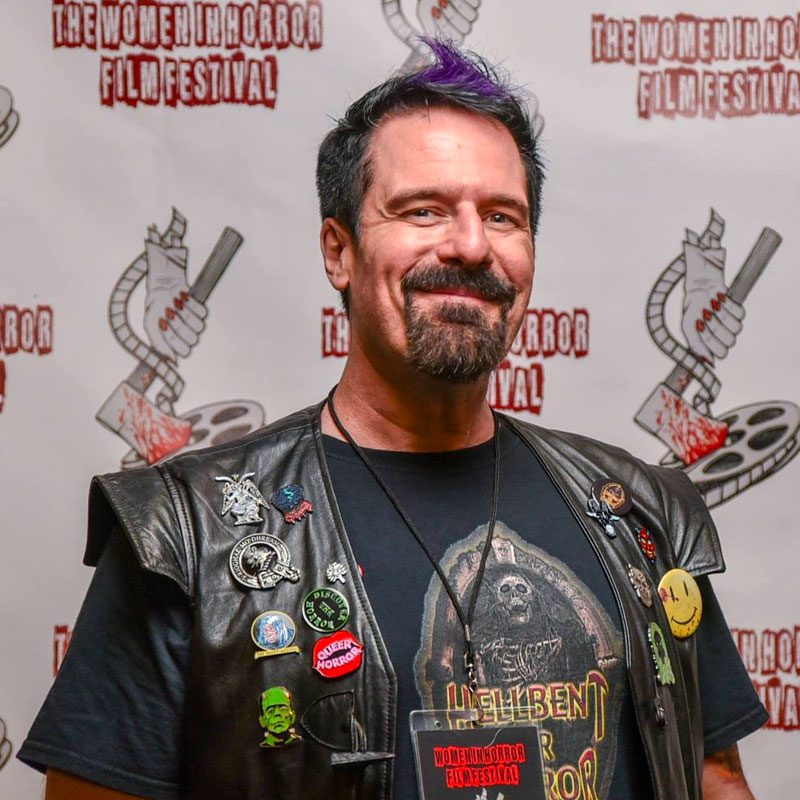Scott Bradley isn’t your stereotypical podcaster.
Before diving into creative work, the former Silicon Valley tech recruiter spent years hustling at a handful of startups. But the work became draining.
“Even though I was really good at the job, I hadn’t talked about what I was passionate about for about a decade,” he says on a recent episode of Between 2 Mics. “I was marketing other people’s stuff, but I wasn’t really doing anything for me.”
Scott says he always loved movies and remembers being very animated when he talked about film.
Burnt out on the tech grind, Scott consulted a coach to see how he could parlay his interest in the arts — horror storytelling, in particular — into a new career. The coach suggested podcasting.
“I didn’t even know what a podcast was!” Scott says. “The coach said to me, ‘It’s like on-demand radio. You have a good voice. You want to tell stories. It’s a really cheap way to do that. And it sounds like what you want to do is communicate with people,’” Scott explains.
That was all the convincing Scott needed.
Now, Scott hosts Hellbent For Horror, a scripted podcast all about his favorite topic: horror.
“I like to say I’m here to remind people that they used to love horror movies, and they secretly still do,” says Scott. “I like to talk about horror as all-encompassing. It’s not just movies — it’s books, it’s music. It’s a time-honored way of storytelling.”
In addition to earning a five-star rating on Apple Podcasts and amassing an international listenership, Scott also turned his podcast into a book, “Screaming For Pleasure: How Horror Makes You Happy and Healthy.”
Here’s how Scott grew a cult following that extends from audio to the written word — and his advice for others who wish to follow in his footsteps.
Writing a book is not like yakking into the mic
As Scott grew the podcast, his wife (who is also his podcast producer) urged him to write a book.
“It was a natural progression from doing the podcasts to a book,” he says. “The book is a love letter to all things that go bump in the night, and how horror not only reinvents itself to reflect each generation’s anxieties, but it can also be healing, as well as thrilling.”
Since Scott taps into similar ideas in his podcast, he assumed the pivot from producing a podcast to writing a book would be easy.
“I thought, ‘Man, I got it made. All my stuff is already written. All I need to do is put a few periods and commas in there.’”
Scott quickly realized his assumption was wrong. “It was a lot harder than I thought it was going to be,” he admits. As he got further into writing his book, he realized that writing for the eye required completely different skills than writing for the ear.
“People read differently than they listen,” says Scott. “So you need to write differently for a book than how you write for a podcast.
Podcasting is more casual and allows for more repetition, while books require a clearer, more coherent narrative. For Scott, writing an outline proved to be most helpful when navigating his book’s throughline.
Word to the wise: get a great editor
For Scott, the stakes felt much higher writing a book than producing a podcast. “The book is there forever,” he says.
“It’s a written, signed confession of your ignorance if you don’t study up on what you want to talk about,” Scott continues. “What I found was that I had a lot of opinions I needed to back up.”
Scott called on a great copy editor, who ultimately challenged some of his long-held beliefs.
“Editing just makes you think about it. Like when the book came out, I wasn’t worried because I had already had my most vicious troll write to me before the book ever came out. That was my copy editor. My copy editor tore me apart.”
But that was a good thing — and Scott learned from the experience.
“I think all books would be made better with a really good editor even if you’re a great writer,” advises Scott.
Stay open to change
Juggling writing a book, producing a scripted podcast, and networking at events IRL, Scott eventually burned out. He realized he needed to make a change.
“I was doing three original shows per month,” says Scott. “That was hardcore work because I was basically staying up all night to get them done.”
He cut back to two new podcast episodes a month. Though he was initially reluctant to scale back his production cycle, Scott’s since warmed up to the idea of building breaks between seasons.
“In the month of December, I’m going to do ‘best of’ shows and let people know that we’re coming back in January guns blazing.”
For more useful tips on how to translate a podcast to a book from Scott Bradley, listen to this episode of Between 2 Mics. Be sure to subscribe to get future episodes directly in your preferred podcast player.
Rockwell Felder is a CPA, entrepreneur, and co-founder of SquadCast. He and his team are on a mission to amplify collaboration, seeking to empower creatives to engage in meaningful conversations without barriers.
